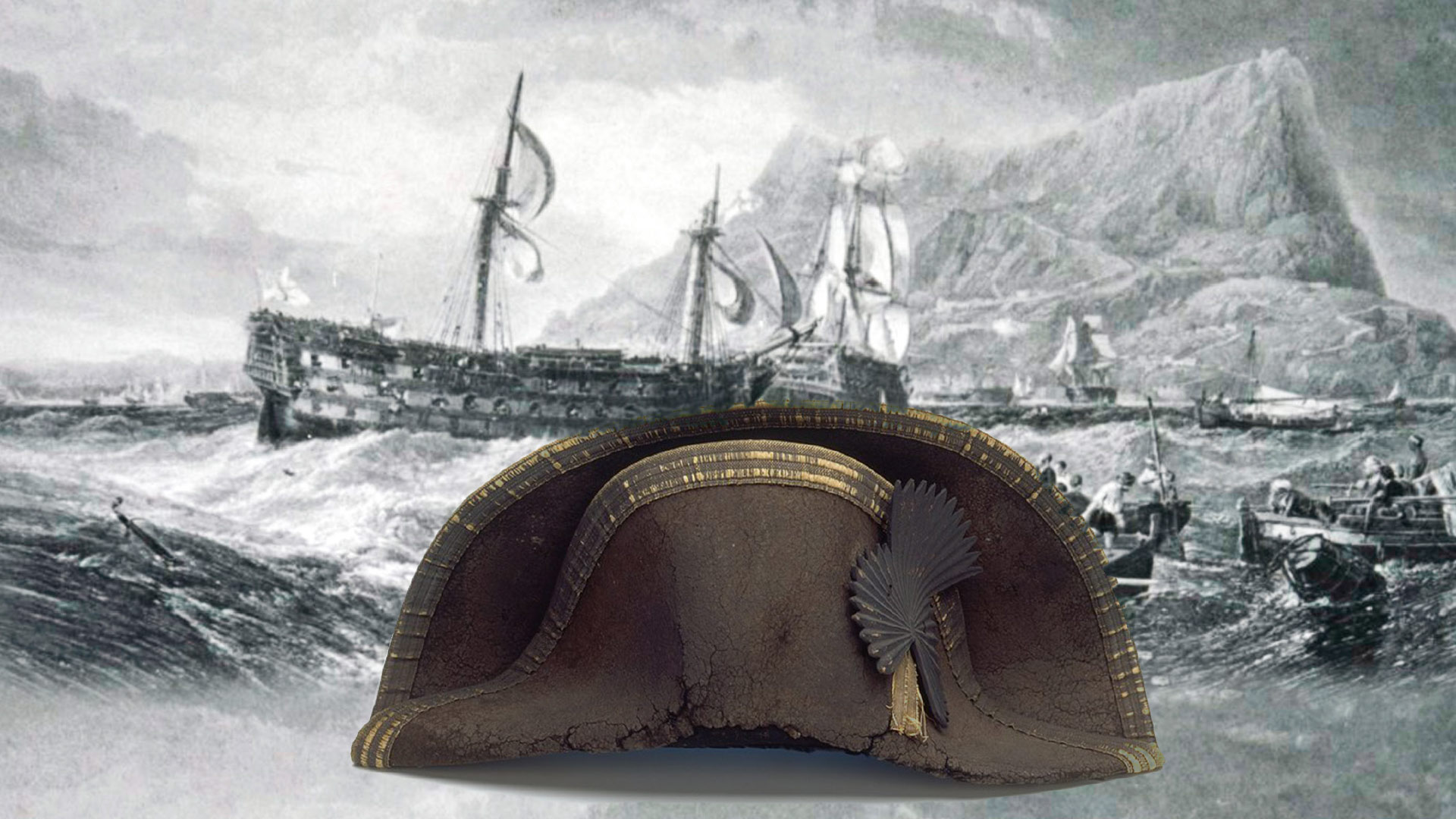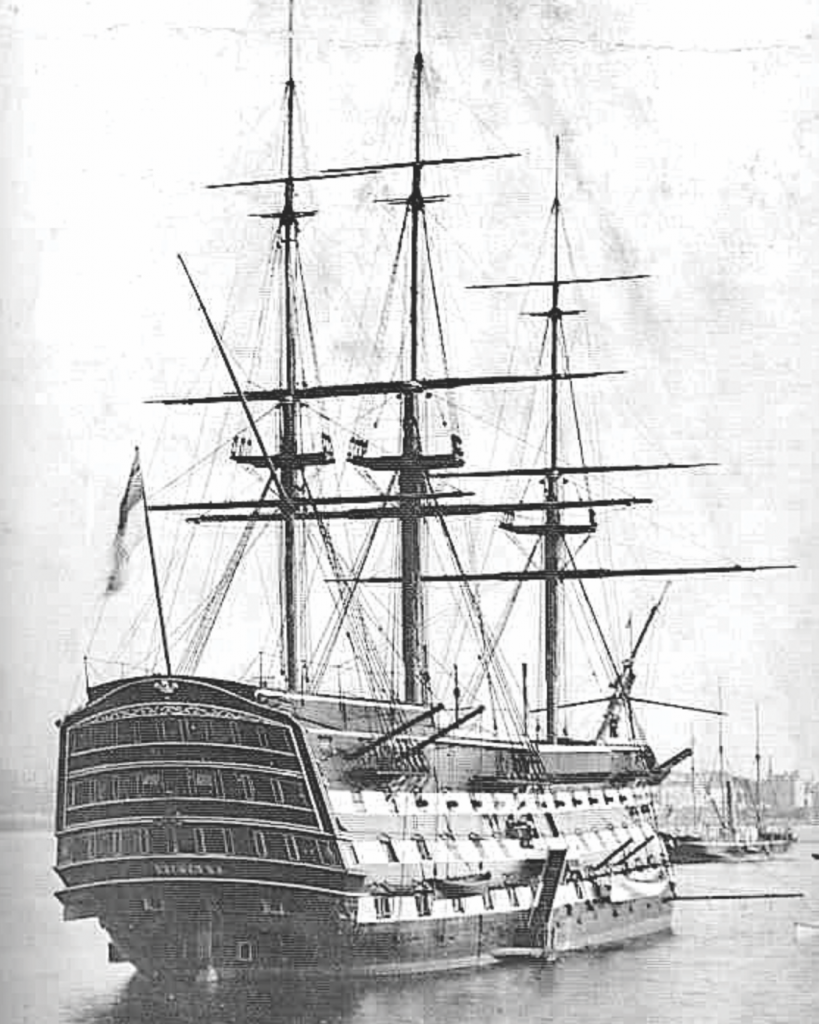AND
All those that took part in the Battle of Trafalgar
October 21st 1805
Part 2 of 2
THE FOLLOWING IS AN EXTRACT OF A LETTER WRITTEN BY AN OFFICER OF THE BELLEROPHON: DEC. 9, 1805
At noon precisely the action commenced by the Fougeux and Monarca opening fire on the Royal Sovereign.
Now follows an extract from our log:
1210
Royal Sovereign opened fire on the enemy’s centre.
1213
answered 16 general signal.
1220
Royal Sovereign, at the head of the larboard division, broke the enemy’s line astern of a Spanish three-decker, and engaged her to leeward, being followed by the Mars, Belleisle, and Tonnant, who engaged their respective opponents.
1225
opened our fire on the enemy.
1228
Victory, at the head of the starboard division, opened her fire on the enemy.
1230
engaging both sides in passing through the enemy’s line, astern of a Spanish two-decker (El Monarca.)—1235, fell on board the French two-deck ship 1’Aigle, whilst hauling to the wind, our fore-yard locking with her main one, kept up a brisk fire both on her, on our starboard bow, and a Spanish two-decker (El Monarca) on the larboard bow, at the same time receiving and returning fire with a Spanish two- decker (Bahama) on the larboard quarter, and receiving the fire of a Spanish two-decker (St. Juan Nepomuceno) athwart our stern, and a French two-decker (La Swiftsure) on the starboard quarter: the action soon after became general.
1300
the main and mizen- top-masts fell over the starboard side, main-top-sail and top-gallant-sail caught fire.
1305
the Master, Midshipman and the Captain fell, still foul of L’Aigle, and keeping up a brisk fire from the main and lower decks; quarter-deck, poop, and forecastle being nearly cleared by the enemy’s musketry, chiefly from troops on board L’Aigle.
1320
the jib-boom was shot away.
1340
L’Aigle dropped astern under a raking fire from us as she fell off, our ship at this time quite unmanageable from braces, bow- lines, etc. shot away.
1345 L’Aigle was engaged by the Defiance.
1405
she struck.— On the smoke clearing up, observed several of the enemy’s ships had struck.—Fired several shot at El Monarca, our first opponent, when she struck.
1500
sent an officer and party of men to take possession of her.
1506
the ship being ungovernable, and in danger of falling on board of Tonnant, Temeraire, and prizes,
Made 318 (signal) to Sirius, out boats and sent them ahead to tow, towed and swept the ship clear of them (the enemy ships); received prisoners from our prizes.
1605
answered 101. (a signal code)
1610
opened our fire on five French ships making off to windward, the sternmost of which was cut off, and struck to the Minotaur.
1707
the fighting ceased, thirteen sail of the enemy’s ships making off to leeward, four of their line to windward.—
1720
answered 90 general. (a signal)
1730
took possession of El Bahama, Spanish
1901
Sunset, one of the prizes sunk, another blew up.” Thus far our log ; but it will not be amiss to mention, that whilst engaged with the fire ships in this situation, L’Aigle twice attempted to board us, and hove several grenades into our lower deck, which burst and wounded several of our people most, dreadfully; she likewise set fire to our fore chains; our fire was so hot, that we soon drove them from the lower deck, after which our people took the (quoins)coins out, and elevated their guns, so as to tear her decks and sides to pieces: when she got clear of us, she did not return a single shot whilst we raked her, her starboard quarter was entirely beaten in, and, as we afterwards learnt, 400 men hors de combat, so that she was an easy conquest for the Defiance, a fresh ship: we were well matched, the being the best manned ship in the Combined, and we in the British fleet. Unfortunately situated as we were, I have no doubt she would have struck, had we been able to follow and engage her for a quarter of an hour longer; but had we been fairly alongside of her, half an hour would have decided the contest; for I must say I was astonished at the coolness and undaunted bravery displayed by our gallant and veteran crew, when surrounded by five enemy’s ships, and for a length of time unassisted by any of ours. Our loss, as might be expected, was considerable, and fell chiefly on our prime seamen, who were foremost in distinguishing themselves; twenty-eight, including the Captain, Master, and a Midshipman, were killed outright; and 137, including the Captain of Marines, who had eight balls in his body, and his right arm shot off, before he quitted the deck; Boatswain, and five Midshipmen, were badly wounded, and about forty more slightly, so as not to be incapable of duty; nineteen of the wounded had already died before we left Gibraltar. I consider myself as very fortunate in having escaped unhurt, as our class suffered so severely.
Following the battle, Admiral Collingwood sent a despatch to the Governor of Gibraltar telling him of the victory. This news arrived on the war schooner Flying Fish on October 23rd and was published in the Gibraltar chronicle on October 24th.
Gibraltar Chronicle extraordinary
THURSDAY, OCTOBER 24th 1805
EURYALUS, AT SEA, OCTOBER 22, 1805.
Yesterday a battle was fought by His Majesty’s fleet, with the combined fleets of Spain and France, and a victory gained, which will stand recorded as one of the most brilliant and decisive that ever distinguished the British Navy.
The enemy’s fleet sailed from Cadiz, on the 9th, in the morning, thirty three sail of the line in number, for the purpose of giving battle to the British Squadron of twenty seven and yesterday at eleven am., the contest began, close in with the Shoals of Trafalgar
At Five pm. seventeen of the enemy has surrendered, and one (L’Achille) burnt, amongst which is the Sta. Ana, the Spanish Admiral Don D’Aleva, mortally wounded, and the Santisima Trinidad. The French Admiral Villeneuve is now a prisoner on board the Mars; I believe three Admirals are captured. Our loss has been great in men; but, what is irreparable, and the cause of universal lamentation, is the death of the noble Commander Chief, who died in the Arms of Victory. I’ve not yet any reports from the ships, but have heard that Captains Duff and Cook fell in the action.
I have to congratulate you upon the great event, and have the Honour to be, &c.
(Signed) C. Collingwood
To Hon: Gen. H E Fox, &c. &c. (Governor of Gibraltar)
The Chronicle continues:
In addition to the above particulars of the late glorious Victory, we are assured that 18 Sail of the Line were counted in our possession, before the vessel, which brought the above dispatches, left the Fleet; and that three more of the enemy vessels were seen driving about, perfect wrecks, at the mercy of the waves, on the Barbary shore, and which will probably also fall into our hands.
Admiral Collingwood in the Dreadnought, led the van of the British Fleet most gallantly into action, without firing a shot, till his yardarms were locked with those of the Santisima Trinidad, when he opened so tremendous a fire, that in fifteen minutes, she was completely dismasted, and obliged to surrender. Lord Nelson, in the Victory, engaged the French Admiral most closely; during the heat the action, his Lordship was severely wounded with a grape shot, in the side, and was obliged to be carried below. Immediately on his wound being dressed, he insisted upon being again brought upon deck, when, shortly afterwards, he received a shot through his body; he survived however, till the evening; long enough to be informed of the capture of the French Admiral and of the extent of The Glorious Victory he had won.– His last words were, “Thank God I have outlived this day, and now I die content”
A despatch was sent to the Admiralty in London on board the schooner Pickle
The Pickle passed the news to Captain Sykes on the Nautilus which he met off Portugal. This ship sped to Lisbon to give the tidings to the Consul there. Meanwhile the Pickle continued on to the Channel where it met up with the Mouse Hole fishing fleet. They immediately left for Penzance with the news which was passed to the Mayor who was attending a function at the Union Hotel.
Captain Lapenotiere of Pickle landed at Falmouth where he took a Post-Chaise for London. On route he passed through Truro, Tavistock, Exeter, Axminster and Basingstoke, giving the tidings as he went.
The despatches were delivered to the Secretary to the Board, William Marsden who was still working as the Captain arrived at one in the morning. He woke Lord Barnham, who studied the message and sent a messenger to the King at five am.
The Pickle was a schooner in the rear guard of the fleet and is unlikely to have taken part in the fighting but was used as a messenger.
Article supplied by History Society Gibraltar.
Email: historysocietygibraltar@hotmail.com










